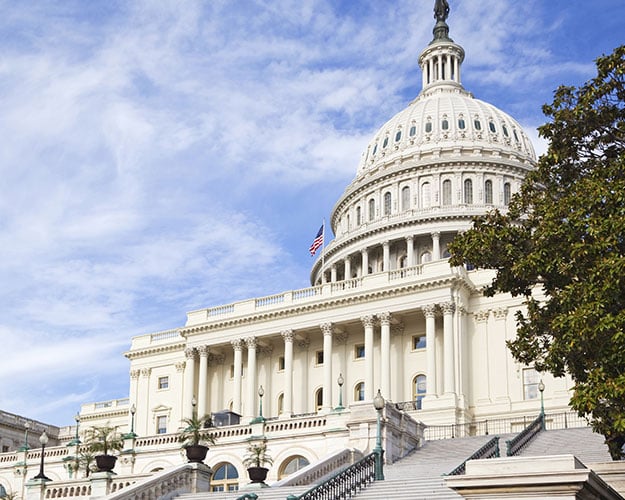Key Takeaways
- Proposed legislation extends and codifies many aspects of the Tax Cuts and Jobs Act of 2017 that are currently set to expire at the end of 2025.
- The legislation allows for full expensing of qualified business property and R&D expenditures and relaxes the limitation on business interest deductions.
- The legislation phases out certain energy credits created as part of the Inflation Reduction Act.
On May 22, 2025, the U.S. House of Representatives passed major tax legislation, the so-called “One Big, Beautiful Bill Act,” that would extend expiring provisions of the Tax Cuts and Jobs Act of 2017, while also adding new tax changes. The legislation passed by a single vote, 215-214, and will now be considered by the Senate under its reconciliation procedure. Both House and Senate Republican leaders have said they hope to pass final legislation, to be sent to President Trump for signature, by July 4.
While the tax portion of the bill generally follows a version passed by the House Ways and Means Committee on May 12, there were several significant changes made through a “manager’s amendment” added to the legislation by the House Rules Committee. Those changes include a quicker phase-out of certain clean energy credits and a new limit to the state and local tax deduction.
See below for an overall summary of the legislation we previously provided last week, with the provisions added or changed by the manager’s amendment in red.
Business Considerations
- Full Expensing. One hundred percent bonus depreciation is again allowed, under the proposed legislation, for qualified assets placed into service after January 19, 2025. This bonus depreciation would be in effect through the 2029 tax year.
- Business Interest Expense Limitation. Business interest expense is limited under the TCJA to 30% of the so called Adjusted Taxable Income (ATI). ATI was defined to roughly equal earnings before interest, taxes, depreciation, and amortization (EBITDA) up until the 2021 tax year, with ATI equal to EBIT after. The proposed legislation would again define ATI to equal EBITDA for tax years beginning after December 31, 2024, and before January 1, 2030.
- Section 174 R&D Expensing. Under the proposed legislation, domestic specified research or experimental expenditures can again be immediately expensed for tax years beginning after December 31, 2024, and before January 1, 2030.
- QBI Permanency. The qualified business income (QBI) deduction for pass-through businesses (partnerships, S corporations, and sole proprietors) would be made permanent and increased to 23%. Further, certain phase-in limitations would be introduced related to wages paid and depreciable property.
Individual Considerations
- Rate Extensions. This proposed legislation makes the TCJA’s tax rates permanent and adjusts the bracket thresholds for inflation.
For example, a married filing joint couple would pay tax at the 37% rate once taxable income exceeds $767,150 for the 2026 tax year.
- Modification of SALT Deduction. A $10,000 limitation for state and local taxes (SALT) was instated by the TCJA. And in response, many states enacted “work arounds” to this limit, including the so called passthrough entity tax (PTET) regime. The proposed legislation raises the SALT deduction limit to $40,000 for married filing joint filers for so called “specified taxes,” subject to taxable income phaseouts beginning at $500,000 for married filing joint filers. Even after the phase outs, a taxpayer is still entitled to a deduction of up to $10,000. Importantly, the term “specified taxes” is defined to include PTET payments, meaning these payments may not provide a full deduction for higher income taxpayers. These rates will increase slightly over the next 10 years, and will become permanent from 2035 onward.
- No Tax on Tips. Taxpayers are entitled to a deduction for “qualified tips” earned by individuals working in specific industries with income below certain amounts. This proposal sunsets after the 2028 tax year.
Estate and Gift
- Exemption Amount. The proposed legislation permanently increases the unified estate and gift tax exemption to an inflation-indexed $15 million ($30 million for a married couple using portability), an increase from the present amount of $7.14 million.
Other Provisions in the New Tax Legislation
- Opportunity Zones. There are a number of proposed changes to the Opportunity Zone tax incentives program, including extending the recognition date for deferred gains from 2026 to 2028 and the designation of new opportunity zones. The proposed legislation also introduces a new information reporting regime for both qualified opportunity funds and qualified opportunity zone businesses.
- Termination of Certain IRA Credits. Certain tax credits created as part of the Inflation Reduction Act of 2022 (IRA) would be eliminated at the end of the 2025 tax year, including tax credits for new and used clean vehicles. Credits for clean electricity will expire in 2028, and the bill scales back the ability of taxpayers to buy or sell the credits and includes new prohibitions on financing from foreign entities determined to be national security risks.
What is Not Included?
There is no change to the treatment of carried interest or to the current 21% corporate tax rate. There is also no change to the capital gains tax rate or to the tax rate for high income taxpayers.
What is Next?
The House has publicly stated it hopes to approve this legislation by Memorial Day, but given slim majorities, ultimate approval may happen later in the summer. And then the Senate will consider the legislation, and this could entail further modifications and changes.
Our team of professionals is here to help you make sense of this evolving tax legislation.
Stay Up to Date

Tax
We have the tax expertise to meet your business needs.
Who We Are
Eide Bailly is a CPA and business advisory firm helping our clients grow, thrive, and embrace opportunities and innovation.




